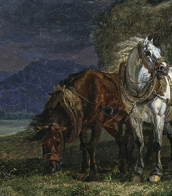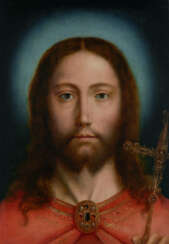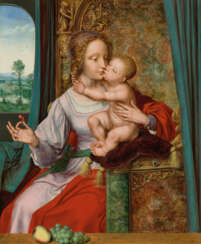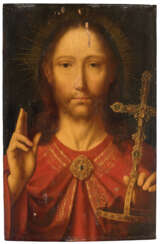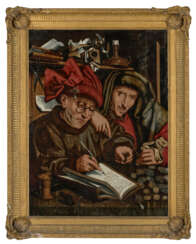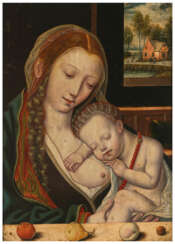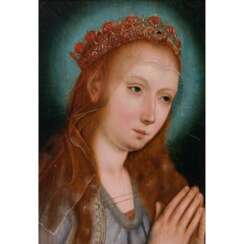квентин массейс (1466 - 1530)
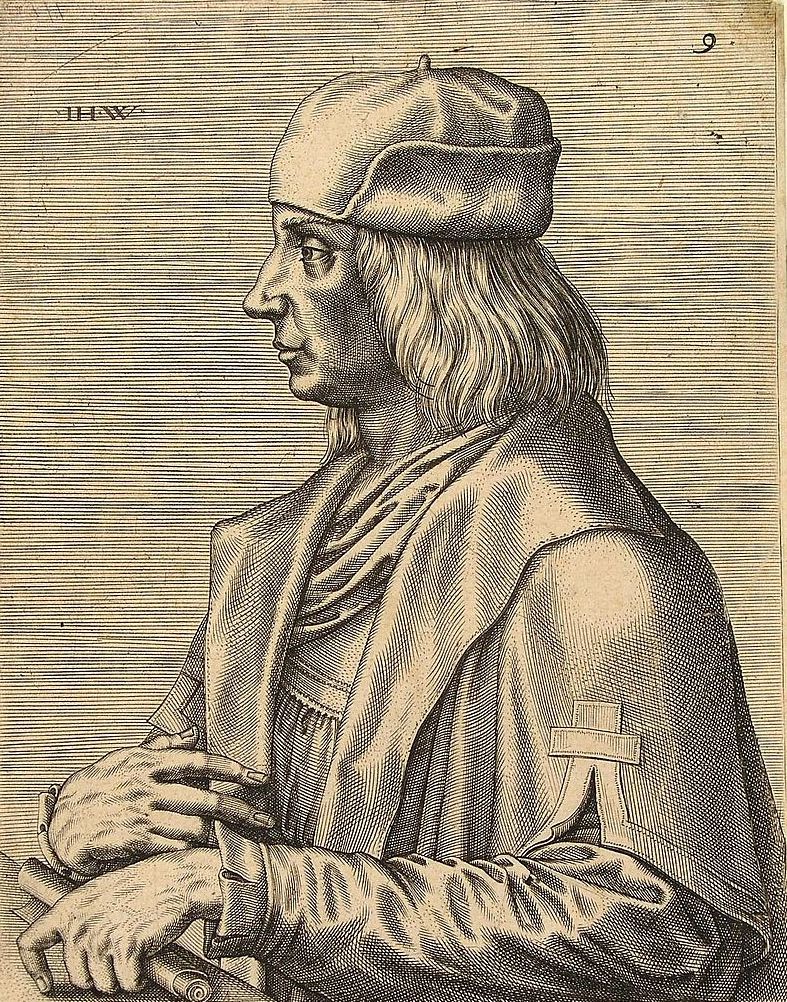
Quentin Matsys (Dutch: Quinten Matsijs), a Flemish painter born around 1466 in Leuven, is recognized as a pivotal figure in the Early Netherlandish tradition and a founder of the Antwerp school of painting. His initial training as an ironsmith in his father's workshop lent a unique craftsmanship to his artistic endeavors. Matsys' works, which often contained religious themes and satirical elements, were instrumental in the transition from medieval to Renaissance art in northern Europe.
Matsys' early works exhibit the influence of Hans Memling, and later, his exposure to Italian Renaissance artists, especially Leonardo da Vinci, is evident in his refined technique. This amalgamation of Northern European and Italian influences resulted in a distinctive style that earned him the reputation as the leading painter in Antwerp during the early 16th century.
Today, Matsys' masterpieces are housed in prestigious institutions like the National Gallery in London, serving as a testament to his enduring legacy. His contributions to the art world resonate with collectors and historians alike, who admire his innovative blend of technical skill and evocative expression.
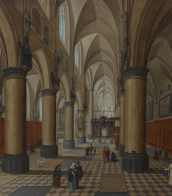

Quentin Matsys (Dutch: Quinten Matsijs), a Flemish painter born around 1466 in Leuven, is recognized as a pivotal figure in the Early Netherlandish tradition and a founder of the Antwerp school of painting. His initial training as an ironsmith in his father's workshop lent a unique craftsmanship to his artistic endeavors. Matsys' works, which often contained religious themes and satirical elements, were instrumental in the transition from medieval to Renaissance art in northern Europe.
Matsys' early works exhibit the influence of Hans Memling, and later, his exposure to Italian Renaissance artists, especially Leonardo da Vinci, is evident in his refined technique. This amalgamation of Northern European and Italian influences resulted in a distinctive style that earned him the reputation as the leading painter in Antwerp during the early 16th century.
Today, Matsys' masterpieces are housed in prestigious institutions like the National Gallery in London, serving as a testament to his enduring legacy. His contributions to the art world resonate with collectors and historians alike, who admire his innovative blend of technical skill and evocative expression.
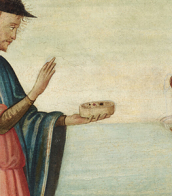

Quentin Matsys (Dutch: Quinten Matsijs), a Flemish painter born around 1466 in Leuven, is recognized as a pivotal figure in the Early Netherlandish tradition and a founder of the Antwerp school of painting. His initial training as an ironsmith in his father's workshop lent a unique craftsmanship to his artistic endeavors. Matsys' works, which often contained religious themes and satirical elements, were instrumental in the transition from medieval to Renaissance art in northern Europe.
Matsys' early works exhibit the influence of Hans Memling, and later, his exposure to Italian Renaissance artists, especially Leonardo da Vinci, is evident in his refined technique. This amalgamation of Northern European and Italian influences resulted in a distinctive style that earned him the reputation as the leading painter in Antwerp during the early 16th century.
Today, Matsys' masterpieces are housed in prestigious institutions like the National Gallery in London, serving as a testament to his enduring legacy. His contributions to the art world resonate with collectors and historians alike, who admire his innovative blend of technical skill and evocative expression.
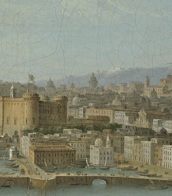

Quentin Matsys (Dutch: Quinten Matsijs), a Flemish painter born around 1466 in Leuven, is recognized as a pivotal figure in the Early Netherlandish tradition and a founder of the Antwerp school of painting. His initial training as an ironsmith in his father's workshop lent a unique craftsmanship to his artistic endeavors. Matsys' works, which often contained religious themes and satirical elements, were instrumental in the transition from medieval to Renaissance art in northern Europe.
Matsys' early works exhibit the influence of Hans Memling, and later, his exposure to Italian Renaissance artists, especially Leonardo da Vinci, is evident in his refined technique. This amalgamation of Northern European and Italian influences resulted in a distinctive style that earned him the reputation as the leading painter in Antwerp during the early 16th century.
Today, Matsys' masterpieces are housed in prestigious institutions like the National Gallery in London, serving as a testament to his enduring legacy. His contributions to the art world resonate with collectors and historians alike, who admire his innovative blend of technical skill and evocative expression.
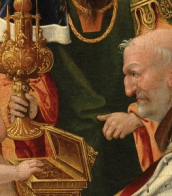

Quentin Matsys (Dutch: Quinten Matsijs), a Flemish painter born around 1466 in Leuven, is recognized as a pivotal figure in the Early Netherlandish tradition and a founder of the Antwerp school of painting. His initial training as an ironsmith in his father's workshop lent a unique craftsmanship to his artistic endeavors. Matsys' works, which often contained religious themes and satirical elements, were instrumental in the transition from medieval to Renaissance art in northern Europe.
Matsys' early works exhibit the influence of Hans Memling, and later, his exposure to Italian Renaissance artists, especially Leonardo da Vinci, is evident in his refined technique. This amalgamation of Northern European and Italian influences resulted in a distinctive style that earned him the reputation as the leading painter in Antwerp during the early 16th century.
Today, Matsys' masterpieces are housed in prestigious institutions like the National Gallery in London, serving as a testament to his enduring legacy. His contributions to the art world resonate with collectors and historians alike, who admire his innovative blend of technical skill and evocative expression.
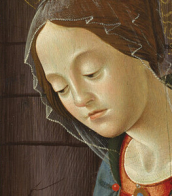

Quentin Matsys (Dutch: Quinten Matsijs), a Flemish painter born around 1466 in Leuven, is recognized as a pivotal figure in the Early Netherlandish tradition and a founder of the Antwerp school of painting. His initial training as an ironsmith in his father's workshop lent a unique craftsmanship to his artistic endeavors. Matsys' works, which often contained religious themes and satirical elements, were instrumental in the transition from medieval to Renaissance art in northern Europe.
Matsys' early works exhibit the influence of Hans Memling, and later, his exposure to Italian Renaissance artists, especially Leonardo da Vinci, is evident in his refined technique. This amalgamation of Northern European and Italian influences resulted in a distinctive style that earned him the reputation as the leading painter in Antwerp during the early 16th century.
Today, Matsys' masterpieces are housed in prestigious institutions like the National Gallery in London, serving as a testament to his enduring legacy. His contributions to the art world resonate with collectors and historians alike, who admire his innovative blend of technical skill and evocative expression.
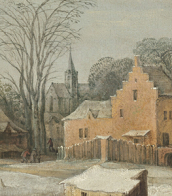

Quentin Matsys (Dutch: Quinten Matsijs), a Flemish painter born around 1466 in Leuven, is recognized as a pivotal figure in the Early Netherlandish tradition and a founder of the Antwerp school of painting. His initial training as an ironsmith in his father's workshop lent a unique craftsmanship to his artistic endeavors. Matsys' works, which often contained religious themes and satirical elements, were instrumental in the transition from medieval to Renaissance art in northern Europe.
Matsys' early works exhibit the influence of Hans Memling, and later, his exposure to Italian Renaissance artists, especially Leonardo da Vinci, is evident in his refined technique. This amalgamation of Northern European and Italian influences resulted in a distinctive style that earned him the reputation as the leading painter in Antwerp during the early 16th century.
Today, Matsys' masterpieces are housed in prestigious institutions like the National Gallery in London, serving as a testament to his enduring legacy. His contributions to the art world resonate with collectors and historians alike, who admire his innovative blend of technical skill and evocative expression.
